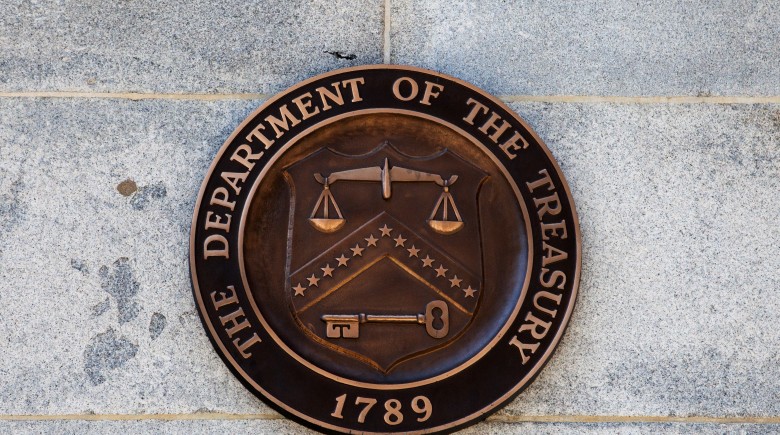While it may seem to be good news that our national debt has not changed since May, that fact has more to do with accounting tricks than any sudden fiscal discipline out of Washington. And with Congress on recess until September, it is a certainty not to be fixed until then at the earliest. In the meantime, spending continues and the Treasury Department finds “savings” from other areas:
So Treasury began to employ a host of “extraordinary measures” to buy Congress time and continue paying all the country’s bills in full and on time. For instance, Treasury first temporarily stopped issuing special securities to state and local governments. It may also, for a time, stop reinvesting federal workers’ retirement savings in short-term bonds.
As Treasury shuffles nonexistent money around, what is Washington doing to prevent the next debt ceiling showdown? Well, at first blush, it looks like business as usual. President Obama is out giving speeches again and he is already blaming republicans for anything that has happened or will happen in the fiscal cliff fight. Republicans, unsurprisingly, are already trying to blame the Democrats, and as an added complication some are trying to make sure that Obamacare is defunded in any negotiation. While this situation does look dire, it’s hard not to feel that we’ve seen this movie before.
One fly in the ointment in all of this may be that the 2014 elections are on the minds of most members of Congress. This may cause more than a few to act as tough-on-spending as possible. Of course, these showdowns often come down to who the American people blame the most, followed quickly by that side caving. There will be a lot of huffing and puffing for the next month or two though.
How does this upcoming battle effect you and your savings? Well, probably not much. As with anything else in the investment world, knowing how something will turn out ahead of time would be very handy. But as that is not possible, it is always prudent to be prepared for everything. Markets will roil if it ever gets to the point that the U.S. has to stop paying some bills. Even then though, the markets may be relatively calm. It’s not so much that markets won’t be nervous and volatile, it’s just that they will also be looking ahead. As we’ve seen from the past debt ceiling fights, markets tend to put the problem in the rear view mirror almost immediately. So, a bit ironically, the markets get more and more anxious as the solution grows closer and closer. Now, of course this time could be different, so it is important that your portfolio can withstand a hurricane. But it’s also prudent not to panic and interrupt your long term plan on what could be just a short-term worry.
And don’t forget that Congress has an outlet that they have used before during similar times and that is to simply grant an extension. If things get a little overheated, don’t be surprised to see this maneuver come into play again. We’ll be keeping an eye on the situation here art PrimeRates and will naturally keep you posted on any interesting developments.
While it may seem to be good news that our national debt has not changed since May, that fact has more to do with accounting tricks than any sudden fiscal discipline out of Washington. And with Congress on recess until September, it is a certainty not to be fixed until then at the earliest. In the meantime, spending continues and the Treasury Department finds “savings” from other areas:
So Treasury began to employ a host of “extraordinary measures” to buy Congress time and continue paying all the country’s bills in full and on time. For instance, Treasury first temporarily stopped issuing special securities to state and local governments. It may also, for a time, stop reinvesting federal workers’ retirement savings in short-term bonds.
As Treasury shuffles nonexistent money around, what is Washington doing to prevent the next debt ceiling showdown? Well, at first blush, it looks like business as usual. President Obama is out giving speeches again and he is already blaming republicans for anything that has happened or will happen in the fiscal cliff fight. Republicans, unsurprisingly, are already trying to blame the Democrats, and as an added complication some are trying to make sure that Obamacare is defunded in any negotiation. While this situation does look dire, it’s hard not to feel that we’ve seen this movie before.
One fly in the ointment in all of this may be that the 2014 elections are on the minds of most members of Congress. This may cause more than a few to act as tough-on-spending as possible. Of course, these showdowns often come down to who the American people blame the most, followed quickly by that side caving. There will be a lot of huffing and puffing for the next month or two though.
How does this upcoming battle effect you and your savings? Well, probably not much. As with anything else in the investment world, knowing how something will turn out ahead of time would be very handy. But as that is not possible, it is always prudent to be prepared for everything. Markets will roil if it ever gets to the point that the U.S. has to stop paying some bills. Even then though, the markets may be relatively calm. It’s not so much that markets won’t be nervous and volatile, it’s just that they will also be looking ahead. As we’ve seen from the past debt ceiling fights, markets tend to put the problem in the rear view mirror almost immediately. So, a bit ironically, the markets get more and more anxious as the solution grows closer and closer. Now, of course this time could be different, so it is important that your portfolio can withstand a hurricane. But it’s also prudent not to panic and interrupt your long term plan on what could be just a short-term worry.
And don’t forget that Congress has an outlet that they have used before during similar times and that is to simply grant an extension. If things get a little overheated, don’t be surprised to see this maneuver come into play again. We’ll be keeping an eye on the situation here art PrimeRates and will naturally keep you posted on any interesting developments.







